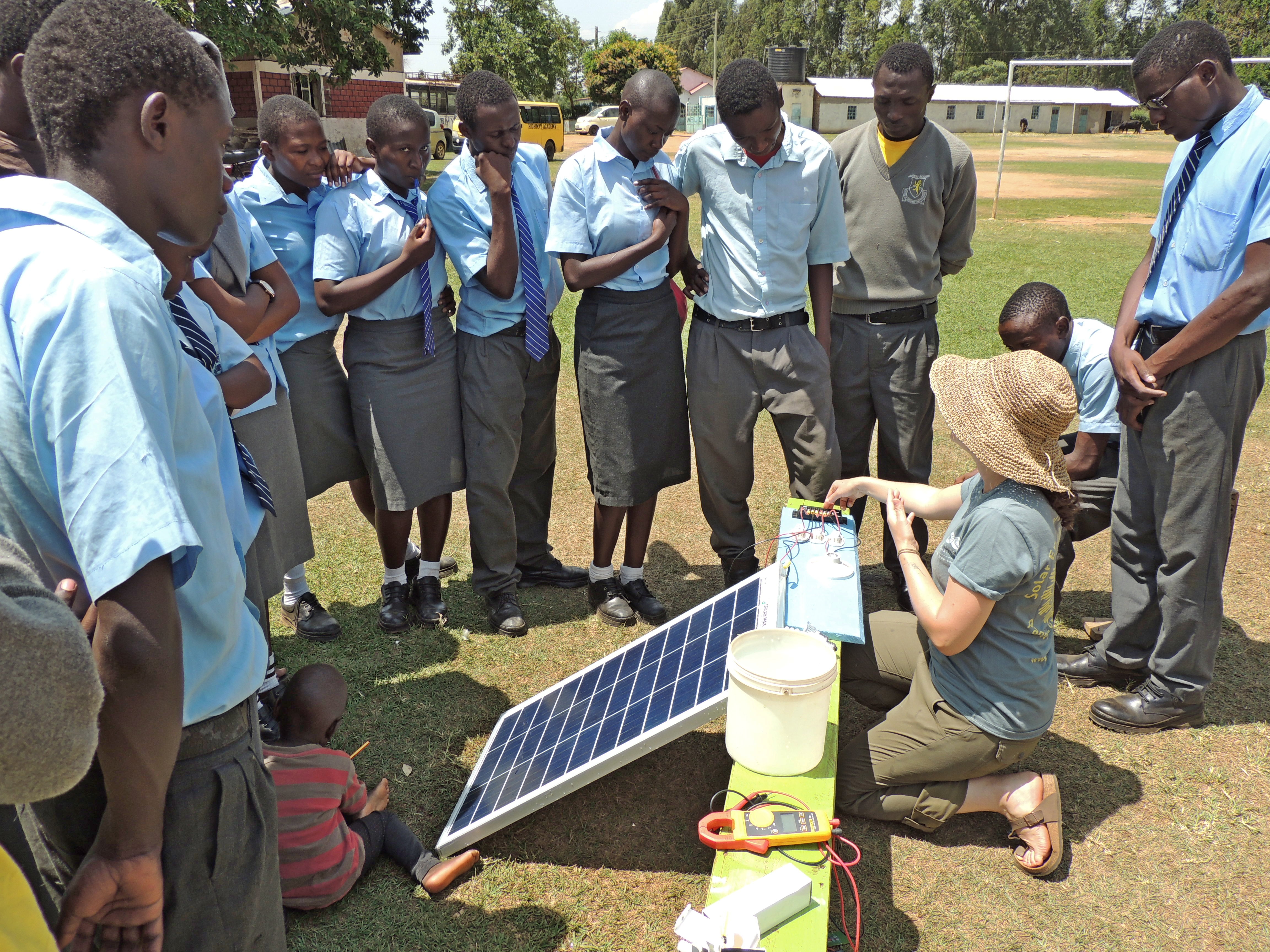Karo Fernandez, SEI Curriculum Developer for the Spanish Program, had travel to the Wema Centre in Kenya with Engineers Without Borders Chicagoland Professional Chapter to design improvements for the water system including evaluating data for moving the water pump to a solar grid.
Karo’s assignment was to asses the site for solar water pumping system, evaluate existing electrical system and assess site for potential solar energy back-up systems.
Solar Energy International (SEI) in support to their mission, donated:
- A charge controller lab: PV module, Sun-Saver10 charge controller, AGM battery, 12 V DC lightbulbs. Objective: teach young people how an off-grid PV system operates; test and understand how current flows in an off-grid PV system; measure consumption of different lighting technologies (LED, CFL and incandescent) to decide which one is most efficient.
- A pump-in-bucket lab: 12 V DC pump, 12 V PV module, 3/4″ hose. Objective: teach young people about the simplicity and advantages of PV-direct systems. The school has a well and pump system that isn´t functional because the grid is down most of the time. PV direct could solve this, and teaching these young adults what they can do is what SEI set out to do with this lab.

Karo commented about the experience:
The location
Wema Children’s Centre and Highway Academy are an orphanage and boarding school in Bukembe Village, Western Kenya run by Teresa Wati and Stephen Juma. They invested much of their wealth to establish Wema Children’s Centre and to this day, they are responsible for the education and well-being of over 500 school children. EWB Chicagoland Professional Chapter became involved in 2016, since then the team has designed and overseen the construction of a water treatment system for their borehole.
Team Wema Work
The Wema Team traveled in April 2019 to assess and advance all active projects at the site and meet with local contractors to discuss how to proceed with the solar, water, and bathroom projects. The team also constructed a pilot rainwater catchment system with the community, which will be used to evaluate the amount of water captured, the quality of the water, and the overall community use of the water and satisfaction of the catchment. This data will help drive future implementations of the rainwater collection systems throughout the campus and determine the water usage purpose from allocation toward toilet flush water in the new bathrooms, to laundry or irrigation purposes.
“I lived at Wema Children´s Center for 10 days, and not once did we have running water because the grid was down. The infrastructure is there, but the utility is negligent to solve a few issues that could provide running water to Wema and many members of this beautiful community. Knowing we can power their pump with solar made me want to get it done right away!”, Karo said.

What’s coming
After the April 2019 assessment, EWB Chicagoland is set for Summer and Fall of 2019 to be primarily tasked with the study and design of water system expansion and solar power final designs for phase 1 implementation in 2020. Prior to the completion of this work, the team is looking to produce a final design for the urgent new bathroom project which will be followed by a remote implementation in Summer/Fall 2019. Fundraising is essential and ongoing efforts must be stepped up to ensure the timely delivery of these projects.
“Grateful to the moon for the opportunity to volunteer for Engineers Without Borders in Kenya, and promote S.E.I.´s mission of a world powered by renewables”, Karo conclude.
¡The Wema Team is looking for volunteers! Are you interested? Contact:
The post SEI supporting EWB solar project to improve water system in orphanage and boarding school Wema Centre in Kenya appeared first on Solar Training - Solar Installer Training - Solar PV Installation Training - Solar Energy Courses - Renewable Energy Education - NABCEP - Solar Energy International (SEI).
No comments:
Post a Comment